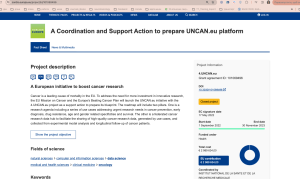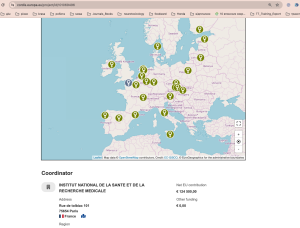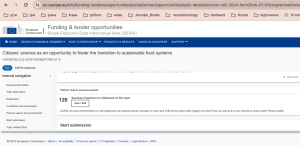Looking for partners
The Horizon Partnership in the Horizon Europe Programme
It is difficult to overestimate the role of partnership in the Horizon Europe Programme. The cooperation of different organizations is the key and one of the integral foundations of many project types within the Programme. In addition, several requirements apply to partners, both by the general conditions of the Programmes and within the framework of individual calls and initiatives. Most projects require at least three organizations from three different EU countries or associated countries of the Horizon Europe Programme. There are also requirements to ensure the so-called multi-actor and multidisciplinary approach, which, in some projects, requires the involvement of Social and Humanities Sciences representatives, etc. In addition, it is often necessary to consider geographical factors, the complementarity of partners, and avoiding duplication – when several partners have essentially the same set of competencies and perform almost the same functions. These requirements give us a clear understanding that in aim to receive funding under the Horizon Europe Programme, it is not enough to have just a good idea; a good ratio and distribution of roles between partners plays a key role, so to create a successful consortium, you need to be very careful about finding partners. It is also essential to pay attention to the eligibility requirements of potential partners. For specific calls, they can be pretty specific; therefore, before starting the path to creating a new consortium, you should always be well acquainted with the requirements and descriptions that apply to each topic.
Knowledge of partner search tools and opportunities will also be beneficial if your organization needs more experience and is looking for consortia in which it could act as a partner.
Things to keep in mind.
Essential aspects to consider in any case, regardless of whether you are creating a consortium or want to become part of someone’s more experienced group:
- Establishing relationships between partners, assigning roles, and successfully combining the expertise of different partners takes a lot of time. Therefore, you should not expect to find partners at the last minute before submitting a proposal. To create a sufficiently robust partnership, you must start working on the project concept in advance and understand the partners required to achieve the expected results. If you want to become a consortium partner, remember this aspect and start actively promoting your organization as a potential partner in advance.
- The basis of a successful consortium is a good combination of partners and the idea of the project; that is why experts do not advise building a partnership based on friendly relations. In the same way, do not expect to be accepted or invited as a partner because you have a long relationship history with the coordinator or with some partner organization.
- By looking for partners or trying to become one yourself, pay special attention to the experience of the organization, the successful project records, the number of staff, the relevance of their expertise, and what competitions and topics they want to be involved in.
- Remember: this step is not only an opportunity to find partners to create a consortium for a specific project idea but also an opportunity to expand your partner network for further cooperation beyond the project application, join innovative knowledge and developments, and find new ideas and inspiration. Therefore, consider this process’s advantages and allocate enough time and resources for it.
Tools and resources for Partner search.
So let’s go directly to the tools and resources for Partners search:
- The simplest and most logical tool for partner search is the “Partner search” section on the EC portal. Here, you can look for partners in the general menu, and under each topic, you can find a list of organizations looking for partners.Various network initiatives and platforms, such as EU Calls , Ideal-Ist, EEN also have similar partner search tools.
- A good resource for Partners search is CORDIS – the informational platform where EU-funded projects are published. This resource offers information about successful projects and their results and complete information about project partners, duration, webpage, etc; you can also analyze which projects with an idea similar to yours have already received funding.



- Brokerage events are one of the most successful tools for Partner search. They not only allow participants to get to know each other but also to present their ideas to a wide range of potential partners interested in one specific area (e.g., health, green energy, security, etc.). Usually, announcements about such events are posted at least a month before the event, so you will have enough time to prepare for the trip qualitatively, study the other participant’s profiles, and make personal meetings with them. Most of the official brokerage events are posted on the B2match platform – register and follow the announcements or subscribe to the news in the direction you are interested in
- One of the efficient and effective ways to find partners lately is through various specialized groups on social networks. On LinkedIn or Facebook, you can find quite a few groups that bring together potential participants in the Programme and those who are still considering the possibility of participating. You can find inquiries about finding partners, interesting articles, and recommendations here.
- Pay additional attention to COST projects – networking projects that bring together research groups from different countries. One of the main goals of these projects is to create partnerships with the subsequent possibility of submitting larger projects under the Horizon Europe Programme. One of the main advantages of COST projects is the opportunity to be included as a partner in running projects.
- Remember the classical methods – conferences, scientific publications, and the exchange of open research data. Don’t forget about your personal partnerships or networks that may be useful to you.
This list of tools and opportunities for Partners search is not complete. There are many other possibilities as well. However, a lot depends on your ability to present yourself and your ideas, which is also a separate art.
Become visible.
You need to put in extra effort to attract attention to your organization. But there are some general expert tips on what to consider when creating your profile on a partner search platform or other resource:
- You need to formulate your request so that it is immediately apparent whether you are looking for partners in your consortium; then, more attention should also be paid to the description of the project idea and information about what kind of partners you are looking for, whether you are offering your organization as a partner.
- You need to choose the contests and topics you are interested in clearly. It is essential not to choose too many – such candidates are treated somewhat warily, believing that it is difficult for them to decide their interests or needs.
- Always indicate your successful experience, specifically relevant to a particular call or topic. Potential partners prefer to spend their time getting acquainted with all your talents with a specific understanding of how this will help them successfully implement the project. So, be as specific as possible when describing your experience and the team’s competencies.
The process of partner search may seem complex and costly. However, remember that a strong consortium is vital to a successful proposal, and the search process itself can also significantly expand your opportunities for submitting a proposal and for the overall development of your organization or research group.